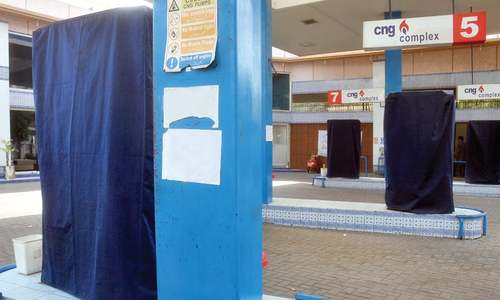• Sets target to convert 3,000 CNG stations and 30pc vehicles
• Endorses PM’s decision on passport-free entry of Sikh pilgrims
• Decides to revamp CDA by appointing chairman from private sector
ISLAMABAD: The federal cabinet on Tuesday approved an ambitious national Electric Vehicles (EV) policy under which a target has been set to convert 30 per cent of four- and tri-wheelers in the country into electric vehicles.
The cabinet meeting, chaired by Prime Minister Imran Khan, also endorsed his decision on visa- and passport-free entry of Sikh pilgrims into Pakistan from India through Kartarpur corridor on the occasion of 550th birth anniversary of Baba Guru Nanak, the founder of Sikh religion, on Nov 9.
To solve people’s problems and take measures to control price hike in the country, Mr Khan gave a three-month deadline to the ministries concerned.
The prime minister termed the Jamiat Ulema-i-Islam (JUI-F) dharna (sit-in) “ineffective” saying that common man had kept himself away from it. He added that the timing of the agitation was not appropriate.
The cabinet expressed satisfaction over an improvement in economic indicators that it hoped would bring relief to the nation soon.
Addressing a joint press conference along with Special Assistant to the Prime Minister on Information Dr Firdous Ashiq Awan after the cabinet meeting, federal Minister for Climate Change Malik Amin Aslam presented a detailed picture of how the government would implement the national EV policy.
He said the government had targeted 30 per cent of total number of vehicles in the country to turn them into electric cars. For this purpose, local car manufacturers had already completed 90 per cent of the spadework, the minister for climate change claimed. “I recently visited Karachi and was surprised to see that local car manufacturers are waiting for the cabinet’s approval for EV policy so that they can roll out their electric vehicles into the market,” he said.
The minister said the EV policy would help reduce emissions of greenhouse gases. “In developed countries, the ratio of emissions of greenhouse gases from vehicles in total volume of environmental pollution is 20pc but here in Pakistan it is 40pc. With introduction of electric cars, trucks, vans and even tri-wheeler rickshaws, the rate of pollution and smog will drop down,” he added.
Mr Aslam said another advantage of the policy was affordable transportation as the cost of running electric vehicles was much lower than that of plying vehicles on petrol, Condensed Natural Gas (CNG) or other fuel.
He expressed the hope that the use of electric vehicles would help the government drastically cut import bill of oil, which was said to be $2 billion annually.
“Another benefit of the policy is that it will boost local car industry and will create hundreds of thousands of new jobs in the country,” the minister for climate change said.
He told the media that more than 3,000 CNG stations, which had been lying closed due to gas shortage, could be converted into EV charging stations.
“Our negotiations are under way with some oil companies in this regard. A firm is ready to establish battery change stations to provide batteries to the commuters on lease,” he said.
The minister said special units of electric car manufacturing would be set up in the under-construction Special Economic Zones being established under the China-Pakistan Economic Corridor.
Kartarpur corridor
Earlier, the special assistant to the prime minister said the cabinet had given approval to the decision of waiving off $20 entry fee for the Sikh pilgrims coming to attend the opening ceremony of Kartarpur corridor. The cabinet also approved visa- and passport-free entry to the Sikh pilgrims on the occasion, she said, adding that the government expected arrival of over 15,000 pilgrims to Pakistan from India and other parts of the world.
Three-month targets
During the cabinet meeting, the Prime Minister asked the ministries to solve problems being faced by common man and take steps to control price hike. For this purpose, Mr Khan gave a three-month deadline to all the ministries.Nadra audit report rejected
Dr Awan told the media that the cabinet meeting rejected the financial audit report of National Database and Registration Authority (Nadra).
Mr Khan directed Nadra officials to get the organisation’s financial audit conducted through some credible and recognised auditors, she said.
She said the meeting also approved an inquiry into the allegations against former chief of the Drug and Regularity Authority of Pakistan Azhar Ali regarding irregularities in DRAP and appointed Ahmed Nawaz Sukhera inquiry officer.
Besides, the cabinet allowed Islamabad’s Capital Development Authority (CDA) revamp within three to six months. It was decided that the CDA would be bifurcated into executive and development wings and that someone from the private sector would be appointed its chairman.
Published in Dawn, November 6th, 2019















































